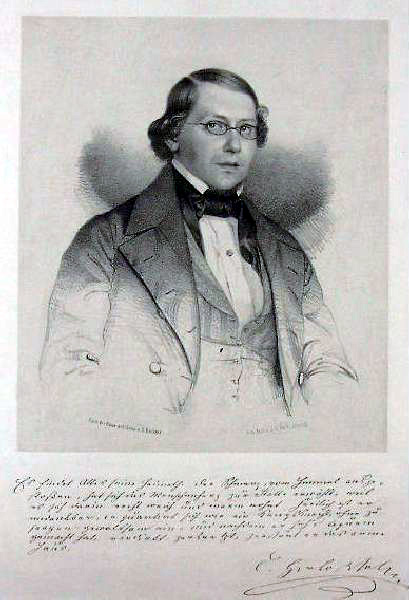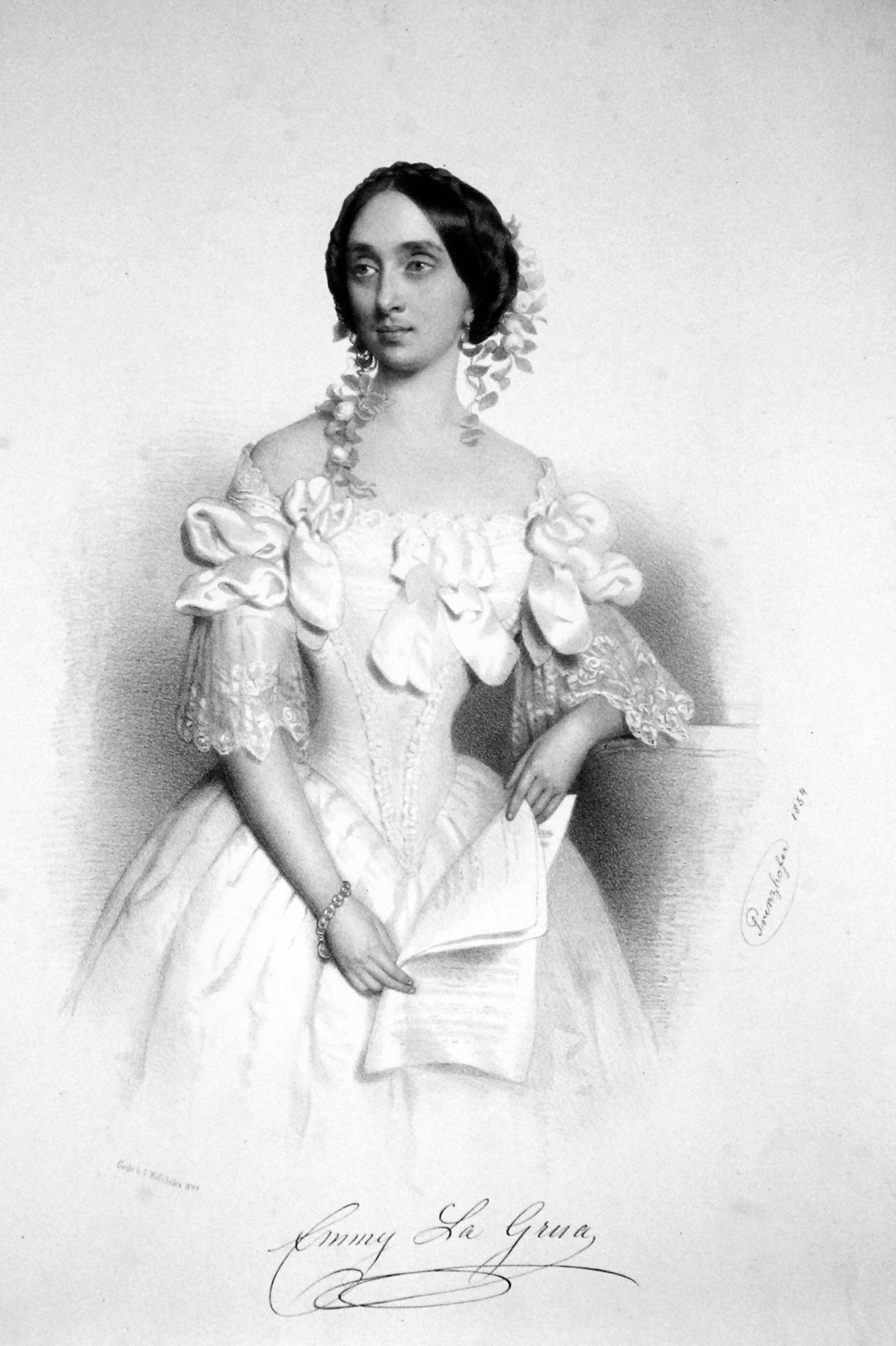|
Friederike Funk
Friederike Funk, married name La Grua bzw. Funk La Grua (14 November 1796 - after 1863) was a German operatic soprano and Royal Saxon Kammersinger in Dresden. Life Born in Meissen, the daughter of a postmaster from her hometown received her vocal training from Johann Aloys Miksch in Dresden from 1813. In May 1816, she received her first engagement at the Dresdner Hoftheater under the direction of Francesco Morlacchi. Afterwards, accompanied by her brother and at the behest of the Saxon king she spent two years in Italy to perfect her voice. She received this royal scholarship through the mediation of Morlacchi. In Italy she performed among others in Naples and St. Carlo and took lessons in Naples with Niccolò Antonio Zingarelli and Luigi Mosca. In the autumn of 1818, now engaged at the Italian and German Operas in Dresden, she sang the title role in Rossini's ''Elisabetta, regina d'Inghilterra'', and in 1822 Agathe in Weber's ''Der Freischütz''. In 1824, she sang Eglantine in ... [...More Info...] [...Related Items...] OR: [Wikipedia] [Google] [Baidu] |
Anna Maria Sessi
Anna Maria Sessi, later known as Anna Maria Neumann-Sessi, (1790 – 3 June 1864) was an Italian-born soprano primarily active in the opera houses of Vienna and Leipzig. Life and career Sessi was born in Rome, the daughter of Giovanni Sessi, himself an opera singer, who moved to Vienna with his family in 1793. She was the second youngest of his five daughters, all of whom became opera singers. Anna Maria was trained in singing by her elder sisters Marianne (177?–1847) and Imperatrice (1784–1808) and made her stage debut at the Imperial Court Theater in Vienna in 1805. During the early years of her career, Sessi sang in Italy, mainly in Bologna, Florence, and Naples, often appearing with her sister Imperatrice. She continued to appear in Italy after Imperatrice's death in 1808, but in 1811 returned to Vienna. In 1813 she married the Austrian businessman Ignaz Neumann, after which she performed as Anna Maria Neumann-Sessi. Sessi sang frequently at the Imperial Court Theater ... [...More Info...] [...Related Items...] OR: [Wikipedia] [Google] [Baidu] |
1796 Births
Events January–March * January 16 – The first Dutch (and general) elections are held for the National Assembly of the Batavian Republic. (The next Dutch general elections are held in 1888.) * February 1 – The capital of Upper Canada is moved from Newark to York. * February 9 – The Qianlong Emperor of China abdicates at age 84 to make way for his son, the Jiaqing Emperor. * February 15 – French Revolutionary Wars: The Invasion of Ceylon (1795) ends when Johan van Angelbeek, the Batavian governor of Ceylon, surrenders Colombo peacefully to British forces. * February 16 – The Kingdom of Great Britain is granted control of Ceylon by the Dutch. * February 29 – Ratifications of the Jay Treaty between Great Britain and the United States are officially exchanged, bringing it into effect.''Harper's Encyclopaedia of United States History from 458 A. D. to 1909'', ed. by Benson John Lossing and, Woodrow Wilson (Harper & Brothers, 191 ... [...More Info...] [...Related Items...] OR: [Wikipedia] [Google] [Baidu] |
German Operatic Sopranos
German(s) may refer to: * Germany (of or related to) **Germania (historical use) * Germans, citizens of Germany, people of German ancestry, or native speakers of the German language ** For citizens of Germany, see also German nationality law **Germanic peoples (Roman times) * German language **any of the Germanic languages * German cuisine, traditional foods of Germany People * German (given name) * German (surname) * Germán, a Spanish name Places * German (parish), Isle of Man * German, Albania, or Gërmej * German, Bulgaria * German, Iran * German, North Macedonia * German, New York, U.S. * Agios Germanos, Greece Other uses * German (mythology), a South Slavic mythological being * Germans (band), a Canadian rock band * "German" (song), a 2019 song by No Money Enterprise * ''The German'', a 2008 short film * "The Germans", an episode of ''Fawlty Towers'' * ''The German'', a nickname for Congolese rebel André Kisase Ngandu See also * Germanic (other) * Germ ... [...More Info...] [...Related Items...] OR: [Wikipedia] [Google] [Baidu] |
Hans Schnoor
Hans Schnoor (4 October 1893 – 15 January 1976) was a German musicologist, journalist and music critic. In the late 1950s, he attracted media attention with his denunciation of Arnold Schönberg's ''A Survivor from Warsaw''. living and work Career Born in Neumünster, Schnoor was the son of a student council. After studying musicology in Leipzig with Hugo Riemann and Karl Straube and completing his doctorate in musicology with Arnold Schering, Schnoor was initially music editor at the Leipzig ''Freie Presse''. Since January 1922 he was director of the feuilleton and music editor of the ''Dresdner Neueste Nachrichten'', before he changed as an editor to the '. In 1926, Schnoor returned to Dresden and was music editor of the '' Dresdner Anzeiger'' until 1945 and also lecturer at the Hochschule für Musik Carl Maria von Weber Dresden. During this time he personally met Richard Strauss and Hans Pfitzner. In addition to his work as a music editor, Schnoor was also active as an au ... [...More Info...] [...Related Items...] OR: [Wikipedia] [Google] [Baidu] |
Allgemeine Musikalische Zeitung
The ''Allgemeine musikalische Zeitung'' (''General music newspaper'') was a German-language periodical published in the 19th century. Comini (2008) has called it "the foremost German-language musical periodical of its time". It reviewed musical events taking place in many countries, focusing on the German-speaking nations, but also covering France, Italy, Russia, Britain, and even occasionally America. Its impartiality and adherence to basic principles of credibility and discretion regarding the personal position of those reviewed, assured and established itself in a high position as a periodical in the musical German society of the time, exercising great influence on the period. History The periodical appeared in two series: a weekly magazine published between 1798 and 1848, and a revived version which lasted from 1866 to 1882. The publisher was Breitkopf & Härtel in Leipzig for the first period of publication and for the first three years of the second period; for the remainde ... [...More Info...] [...Related Items...] OR: [Wikipedia] [Google] [Baidu] |
Caroline Unger
Caroline Unger (sometimes Ungher; 28 October 1803 – 23 March 1877), alternatively known as Karoline, Carolina, and Carlotta,Sadie 1998, p. 867 was an Austro-Hungarian contralto, Biography Born in Vienna (according to erroneous sources, in Stuhlweißenburg, today Székesfehérvár) she studied in Italy; among her teachers were Aloysia Weber Lange and Domenico Ronconi. Her stage debut, in her native city, came in 1821, when she performed in Mozart's ''Così fan tutte'', a performance for which Franz Schubert had briefly served as her répétiteur. Three years later she sang in the first performances of Ludwig van Beethoven's Ninth Symphony and Missa solemnis. She performed a great deal in Italy, principally in Naples after 1825 when she became engaged to the impresario of the Teatro di San Carlo, Domenico Barbaia. Among the roles written for her were those of Isoletta in Vincenzo Bellini's ''La straniera'' (1829, Milan), Gaetano Donizetti's ''Parisina'' (1833, Florence), Anton ... [...More Info...] [...Related Items...] OR: [Wikipedia] [Google] [Baidu] |
Pauline Viardot-García
Pauline Viardot (; 18 July 1821 – 18 May 1910) was a nineteenth-century French mezzo-soprano, pedagogue and composer of Spanish descent. Born Michelle Ferdinande Pauline García, her name appears in various forms. When it is not simply "Pauline Viardot", it most commonly appears in association with her maiden name García or the unaccented form, Garcia. This name sometimes precedes Viardot and sometimes follows it. Sometimes the words are hyphenated; sometimes they are not. She achieved initial fame as "Pauline García"; the accent was dropped at some point, but exactly when is not clear. After her marriage, she referred to herself simply as "Mme Viardot". She came from a musical family and took up music at a young age. She began performing as a teenager and had a long and illustrious career as a star performer. Early life Michelle Ferdinande Pauline García Sitches was born in Paris. Her father, Manuel, a tenor, was a Spanish singing teacher, composer and impresario. Her m ... [...More Info...] [...Related Items...] OR: [Wikipedia] [Google] [Baidu] |
Carl Herloßsohn
Carl Herloßsohn or Karl Herloßsohn (actually Borromäus Sebastian Georg Carl Reginald Herloß, 1804–1849) was a German author, journalist and encyclopaedist.''Karl Herloßsohn'' at the DNB portal. Retrieved 5 Oct 21. Life Herloßsohn was born on 1 September 1804 at the Kleinseite in into a poor background as the son of a tailor. He attended Kleinseite Grammar School from 1813, went to Prague University in 1820 and then to Vienna in 1821 to find a better life there. |
Damen Conversations Lexikon
The ''Damen Conversations Lexikon'' is a 10-volume ''Konversationslexikon'' ( de; a type of dictionary, with encyclopedic explanations) from the 19th century, which at the time of publication was aimed primarily at German women of the bourgeoisie who were interested in education. History At the beginning of the 1830s, the German book market offered around 50 encyclopaedic works that dealt with a wide range of special subjects and were aimed at different target groups. For example, there was the Große Conversations-Lexikon by Joseph Meyer, which was aimed at the educated classes and was distributed in individual volumes. The writer Carl Herloßsohn, who came from a poor background, relied on a similar concept by starting to publish the ''Damen Conversations Lexikon'' in 1834. In doing so, he counted on the interest of women of the bourgeoisie who were hungry for education. Each volume consisted of four issues. In 1838, the tenth volume was completed. The contributors included ... [...More Info...] [...Related Items...] OR: [Wikipedia] [Google] [Baidu] |
Emmy La Grua
Emmy La Grua (also Emma, Emmi or Emilia) (born 15 May 1831 in Palermo; died after 1869) was a 19th-century Italian opera singer (soprano) who performed successfully internationally. Biography Emmy La Grua was the daughter of the royal Saxon chamber musician Friederike Funk and the Italian tenorist Luigi La Grua. In 1837, she moved with her mother to Dresden. She received singing lessons from her mother as well as from Pauline Viardot-García and Caroline Ungher-Sabatier in Paris. In December 1850, Emmy La Grua made her debut in Dresden as Alice in "Robert the Devil" by Giacomo Meyerbeer. Other roles included Donna Anna from Mozart's "Don Giovanni" and Rosine in ''The Barber of Seville'' by Gioachino Rossini. In the following years Emmy La Grua made guest appearances at the Paris Opera, from October 1853 as prima donna at the Vienna Court Opera, from 1854 in Turin and as well as further guest appearances in Vienna, Dresden and Lyon. In 1855, together with Cavaliere Antonio Po ... [...More Info...] [...Related Items...] OR: [Wikipedia] [Google] [Baidu] |
Neue Zeitschrift Für Musik
'Die'' (; en, " heNew Journal of Music") is a music magazine, co-founded in Leipzig by Robert Schumann, his teacher and future father-in law Friedrich Wieck, and his close friend Ludwig Schuncke. Its first issue appeared on 3 April 1834. History Although the first editor was Julius Knorr, most of the work on the early issues of the ''Neue Zeitschrift'' (NZM) was done by Schumann; in 1835, when a new publisher was found, Schumann's name appeared as editor. In his reviews, he praised those of the new generation of musicians who deserved acclaim, including Frédéric Chopin Frédéric François Chopin (born Fryderyk Franciszek Chopin; 1 March 181017 October 1849) was a Polish composer and virtuoso pianist of the Romantic period, who wrote primarily for solo piano. He has maintained worldwide renown as a leadin ... and Hector Berlioz. Schuncke wrote some articles under the byline "Jonathan" but died at the age of 23 in December 1834. In June 1843, Schumann's other commitm ... [...More Info...] [...Related Items...] OR: [Wikipedia] [Google] [Baidu] |







